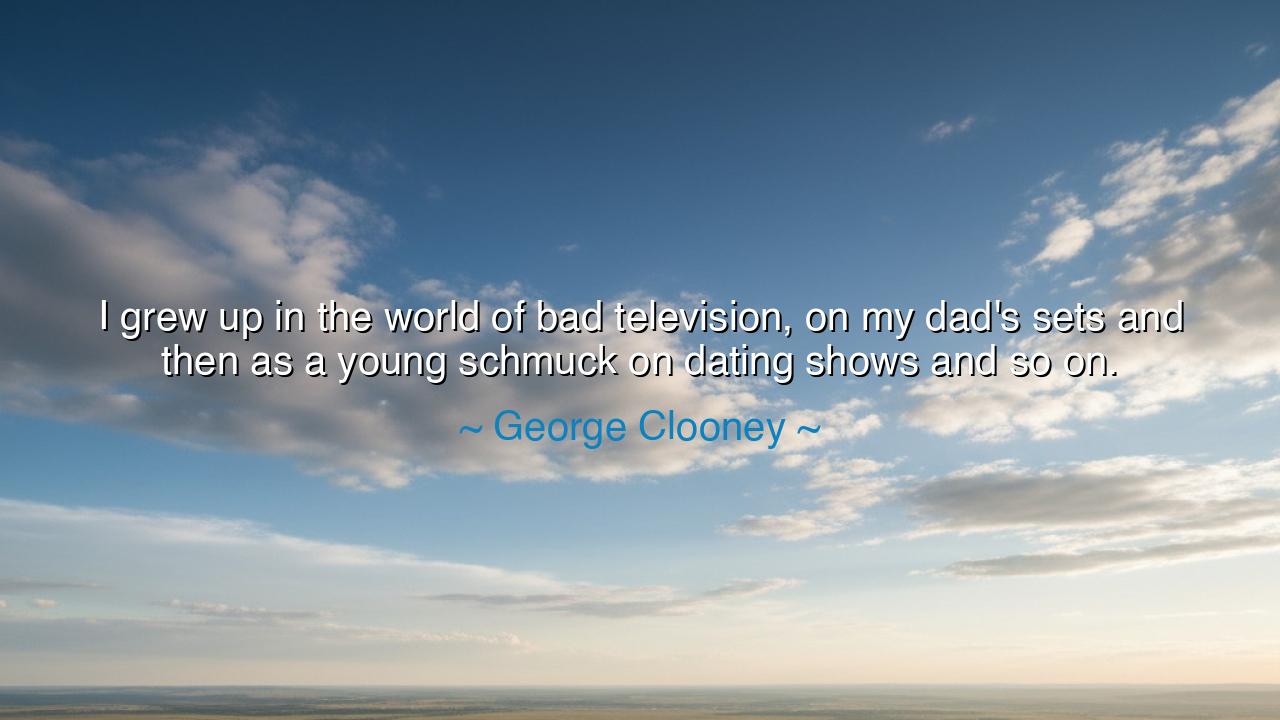
I grew up in the world of bad television, on my dad's sets and
I grew up in the world of bad television, on my dad's sets and then as a young schmuck on dating shows and so on.






In the wry yet reflective words of George Clooney, we glimpse the humble beginnings of a man who would one day ascend to cinematic greatness: “I grew up in the world of bad television, on my dad's sets and then as a young schmuck on dating shows and so on.” Though spoken with humor, this confession carries a wisdom far deeper than its lightness suggests. It is the voice of one who has walked through the unpolished corridors of early struggle and emerged not ashamed, but grateful. For in these words lies a profound truth—that greatness does not spring from perfection, but from perseverance through imperfection; that even the world of “bad television” can become a temple of learning for those who know how to grow within it.
George Clooney, before he was the icon of film and grace, was the son of Nick Clooney, a television personality and news anchor. From a young age, he stood behind the camera, watching the flicker of screens and the chaos of production. He saw the artifice, the missed cues, the cheap lighting, and yet within it all, the sacred rhythm of creation—the attempt, again and again, to connect with an audience, however imperfectly. When he calls it the “world of bad television,” it is not with contempt, but with affection; for he recognizes that the road to mastery begins in the unrefined, the awkward, the forgotten corners of one’s craft. Every great artist must pass through a wilderness of failure before reaching the promised land of form and excellence.
The ancients themselves honored this truth. Before Homer sang of heroes, he was but a wandering bard, repeating the songs of others until his own voice rose above them. Before Leonardo da Vinci painted divinity into mortal faces, he spent years mixing pigments for other masters, cleaning brushes, and learning the weight of patience. Clooney’s “bad television” was his apprenticeship—his first forge of humility. Like the sculptor chiseling through marble to find the figure hidden within, he too had to labor in obscurity before his brilliance could shine. In calling himself a “young schmuck,” he reveals not shame, but wisdom: the knowledge that every true artist must be foolish before he can be wise.
There is something noble in his candor. For in our age, many wish to be born already great, to skip the long and awkward climb toward refinement. But Clooney’s reflection reminds us that the path of mastery is paved with mediocrity bravely endured. The one who begins in “bad television” and learns from it will one day create good television, and perhaps even greatness beyond it. The one who hides from imperfection, however, remains forever shallow, untouched by the trials that forge authenticity. In this way, his words echo the wisdom of Marcus Aurelius, who taught that the obstacle is not the enemy but the teacher, and that to despise the lowly stages of growth is to reject the roots that sustain one’s greatness.
Consider the story of Abraham Lincoln, who, before becoming a figure of legend, failed repeatedly—at business, at elections, even at love. The world mocked him, just as Clooney’s early appearances on forgettable shows might have drawn laughter or indifference. Yet each failure became a rung in the ladder of perseverance. By the time Lincoln rose to leadership, he was not unscarred, but unbreakable. So too does Clooney’s journey from “bad television” to global acclaim remind us that failure is not an end but an initiation—a sacred passage through the fire that tempers the soul.
In his humor lies another lesson: that the wise carry their past lightly. Clooney does not deny his awkward beginnings; he embraces them with laughter. For to laugh at one’s early folly is to show mastery over it. It is the laughter of one who knows that no experience, however embarrassing, is wasted if it teaches humility, work, and resilience. His journey mirrors the timeless saying of the philosophers: “Do not despise the small beginnings, for in them lies the seed of eternity.” The young man who once stood on dating shows became the artist who would one day stand before the world, his craft refined by failure and time.
So, my children of the future, hear this wisdom and take it to heart: do not scorn your beginnings. The awkward stage, the failed attempt, the “bad television” of your own life—these are not curses but teachers. If you stumble, let it be forward. If you are mocked, let it make you wise. For one day, the experiences you now dismiss will become the foundation of your strength, the humus from which greatness grows. Laugh at your folly, cherish your trials, and walk boldly through the imperfect stages of your becoming. For even the brightest stars are born in darkness, and even the finest artists, once, were “young schmucks” learning how to shine.






AAdministratorAdministrator
Welcome, honored guests. Please leave a comment, we will respond soon